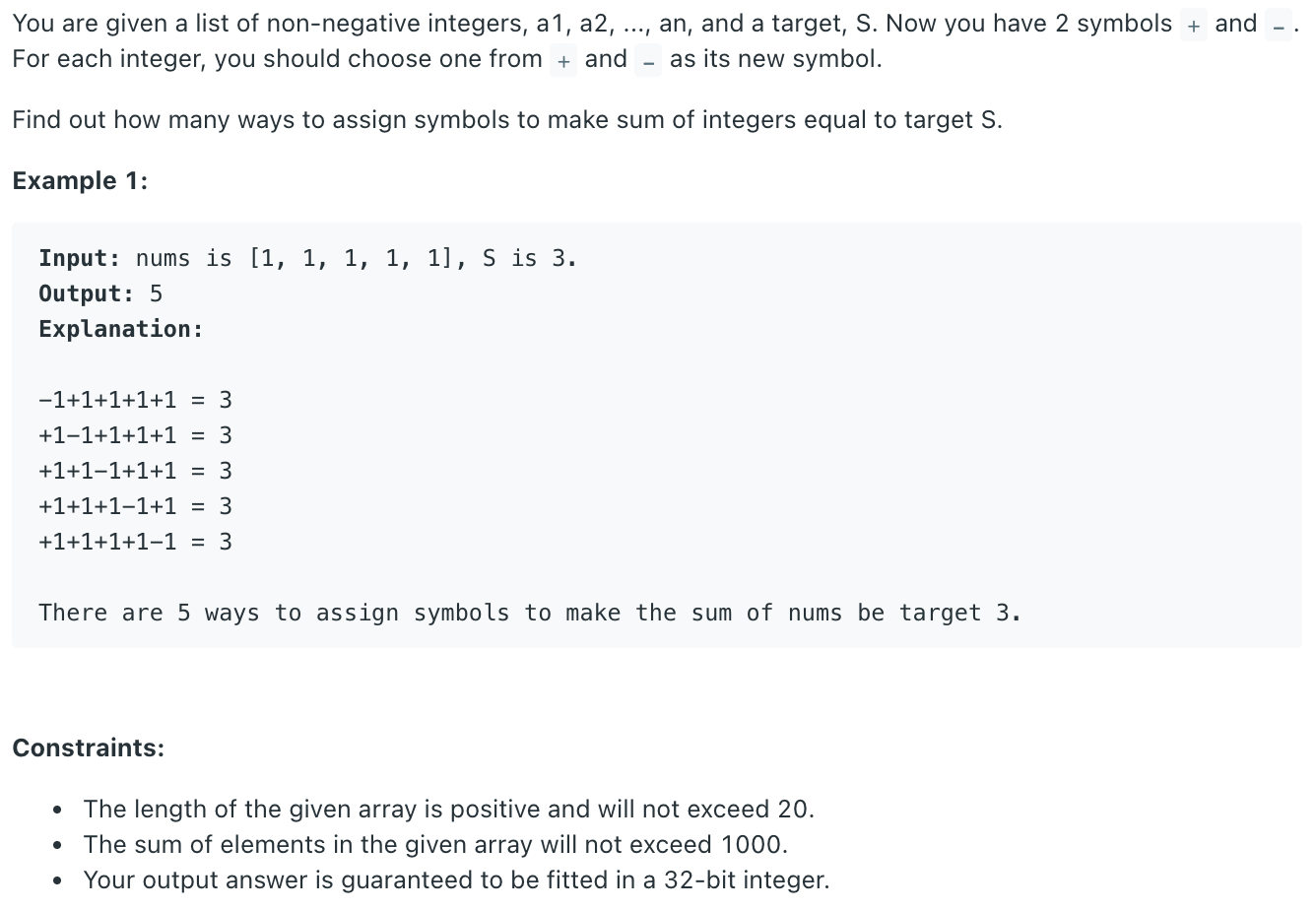Target Sum
franklinqin0 DFSDP

# Solution
Let be the length of the array nums and be the total sum.
# DFS
# Exponential Time (TLE)
The exponential runtime wouldn't pass on long nums.
# test case
nums = [38,21,23,36,1,36,18,3,37,27,29,29,35,47,16,0,2,42,46,6]
S = 14
1
2
3
2
3
Complexity
time:
space:
def findTargetSumWays(self, nums: List[int], S: int) -> int:
n = len(nums)
res = 0
def calculate(i, csum):
nonlocal res
if i == n:
if csum == S:
res += 1
else:
calculate(i+1, csum+nums[i])
calculate(i+1, csum-nums[i])
calculate(0, 0)
return res
1
2
3
4
5
6
7
8
9
10
11
12
13
14
15
2
3
4
5
6
7
8
9
10
11
12
13
14
15
# Time
Complexity
time:
space:
def findTargetSumWays(self, nums: List[int], S: int) -> int:
n = len(nums)
total = sum(nums)
res = 0
memo = [[-sys.maxsize for _ in range(total*2+1)] for _ in range(n)]
def calculate(i, csum):
if i == n:
if csum == S:
return 1
else:
return 0
else:
if memo[i][csum] > -sys.maxsize:
return memo[i][csum]
memo[i][csum] = calculate(i+1, csum+nums[i]) + calculate(i+1, csum-nums[i])
return memo[i][csum]
return calculate(0, 0)
1
2
3
4
5
6
7
8
9
10
11
12
13
14
15
16
17
18
19
20
2
3
4
5
6
7
8
9
10
11
12
13
14
15
16
17
18
19
20
# DP
dp[i][j] represents the number of ways summing previous elements to .
The state transition is:
dp[i][j] = dp[i - 1][j - nums[i]] + dp[i - 1][j + nums[i]]
or:
dp[i][j + nums[i]] += dp[i - 1][j]
dp[i][j - nums[i]] += dp[i - 1][j]
As can reach and , the size of dp is .
# Space
Complexity
time:
space:
def findTargetSumWays(self, nums: List[int], S: int) -> int:
n = len(nums)
total = sum(nums)
if not -total <= S <= total:
return 0
dp = [[0 for _ in range(total*2+1)] for _ in range(n)]
# base case
dp[0][total+nums[0]] = 1
dp[0][total-nums[0]] += 1
for i in range(1, n):
for j in range(total*2+1):
if j-nums[i]>=0 and dp[i-1][j-nums[i]]>0:
dp[i][j] += dp[i-1][j-nums[i]]
if j+nums[i]<=total*2 and dp[i-1][j+nums[i]]>0:
dp[i][j] += dp[i-1][j+nums[i]]
return dp[-1][total+S]
1
2
3
4
5
6
7
8
9
10
11
12
13
14
15
16
17
18
19
2
3
4
5
6
7
8
9
10
11
12
13
14
15
16
17
18
19
# Space
Complexity
time:
space:
def findTargetSumWays(self, nums: List[int], S: int) -> int:
n = len(nums)
total = sum(nums)
if not -total <= S <= total:
return 0
dp = [0 for _ in range(total*2+1)]
# base case
dp[total+nums[0]] = 1
dp[total-nums[0]] += 1
for i in range(1, n):
nxt = [0 for _ in range(total*2+1)]
for j in range(total*2+1):
if j-nums[i]>=0 and dp[j-nums[i]]>0:
nxt[j] += dp[j-nums[i]]
if j+nums[i]<=total*2 and dp[j+nums[i]]>0:
nxt[j] += dp[j+nums[i]]
dp = nxt
return dp[total+S]
1
2
3
4
5
6
7
8
9
10
11
12
13
14
15
16
17
18
19
20
21
2
3
4
5
6
7
8
9
10
11
12
13
14
15
16
17
18
19
20
21
Use another state transition and reduce the range of to traverse. Cannot use the previous relation b/c dp[:nums[i]] and dp[total*2+1-nums[i]:] would never be updated.
def findTargetSumWays(self, nums: List[int], S: int) -> int:
n = len(nums)
total = sum(nums)
if S > total:
return 0
dp = [0 for _ in range(total*2+1)]
# base case
dp[total+nums[0]] = 1
dp[total-nums[0]] += 1
for i in range(1, n):
nxt = [0 for _ in range(total*2+1)]
for j in range(nums[i], total*2+1-nums[i]):
nxt[j-nums[i]] += dp[j]
nxt[j+nums[i]] += dp[j]
dp = nxt
return dp[total+S]
1
2
3
4
5
6
7
8
9
10
11
12
13
14
15
16
17
18
19
2
3
4
5
6
7
8
9
10
11
12
13
14
15
16
17
18
19